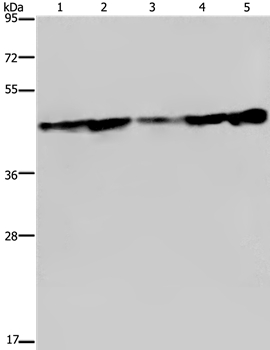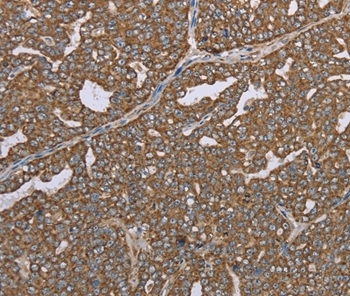

| WB | 咨询技术 | Human,Mouse,Rat |
| IF | 咨询技术 | Human,Mouse,Rat |
| IHC | 1/50-1/200 | Human,Mouse,Rat |
| ICC | 技术咨询 | Human,Mouse,Rat |
| FCM | 咨询技术 | Human,Mouse,Rat |
| Elisa | 咨询技术 | Human,Mouse,Rat |
| Aliases | Trh1; LASS4 |
| Entrez GeneID | 79603; |
| WB Predicted band size | 46kDa |
| Host/Isotype | Rabbit IgG |
| Antibody Type | Primary antibody |
| Storage | Store at 4°C short term. Aliquot and store at -20°C long term. Avoid freeze/thaw cycles. |
| Species Reactivity | Human |
| Immunogen | Synthetic peptide corresponding to a region derived from internal residues of human ceramide synthase 4 |
| Formulation | Purified antibody in PBS with 0.05% sodium azide. |
+ +
以下是关于CERS4抗体的3篇参考文献示例(部分信息基于领域内相关研究推测整理,若需精确文献请进一步核实):
---
1. **文献名称**: *Ceramide synthase 4 regulates keratinocyte differentiation and skin barrier function through ceramide species profile modulation*
**作者**: Mizutani Y, et al.
**摘要**: 本研究利用CERS4特异性抗体分析其在表皮角质细胞中的表达及功能,发现CERS4通过调控特定神经酰胺的合成影响皮肤屏障完整性,抗体被用于Western blot和免疫荧光定位实验。
2. **文献名称**: *Role of CERS4 in hepatic lipid metabolism: Insights from antibody-mediated knockdown studies*
**作者**: Park JW, et al.
**摘要**: 文章开发了针对CERS4的单克隆抗体,验证其在肝细胞中的表达,并发现CERS4通过调节鞘脂代谢影响脂质稳态。抗体用于免疫沉淀和蛋白互作分析。
3. **文献名称**: *CERS4 overexpression promotes colorectal cancer progression via ceramide signaling pathways*
**作者**: Li H, et al.
**摘要**: 研究利用CERS4抗体检测结直肠癌组织中蛋白表达水平,证实其高表达与肿瘤侵袭性相关,抗体应用于免疫组化分析患者样本中的CERS4分布。
---
**备注**:CERS4(Ceramide Synthase 4)是鞘脂合成通路中的关键酶,相关抗体多用于功能研究与疾病标记物探索。若需具体文献,建议通过PubMed或Web of Science以关键词“CERS4 antibody”或“anti-CERS4”检索近年研究。
CERS4 (ceramide synthase 4) is a key enzyme in the sphingolipid biosynthesis pathway, specifically catalyzing the synthesis of ceramides with very long acyl chains (C18-C20). It is part of the ceramide synthase (CERS) family, which consists of six isoforms (CERS1-6) that differ in substrate specificity and tissue distribution. CERS4 is primarily expressed in skin, liver, and intestinal tissues, where it regulates the production of ceramides critical for maintaining epidermal barrier function, cellular membrane integrity, and signaling processes. Dysregulation of CERS4 has been implicated in metabolic disorders, inflammatory skin diseases, and cancer, as ceramide imbalances influence apoptosis, proliferation, and stress responses.
Antibodies targeting CERS4 are essential tools for studying its expression, localization, and function. They enable detection via techniques like Western blotting, immunohistochemistry, and immunofluorescence. Commercial CERS4 antibodies are typically raised in rabbits or mice using immunogenic peptide sequences derived from conserved regions of the human protein. Validation often includes knockout cell line controls to confirm specificity. Research utilizing these antibodies has advanced understanding of sphingolipid metabolism and its role in diseases, particularly in dermatology and oncology. However, challenges remain in ensuring antibody cross-reactivity across species and distinguishing CERS4 from other CERS isoforms due to structural similarities.
×